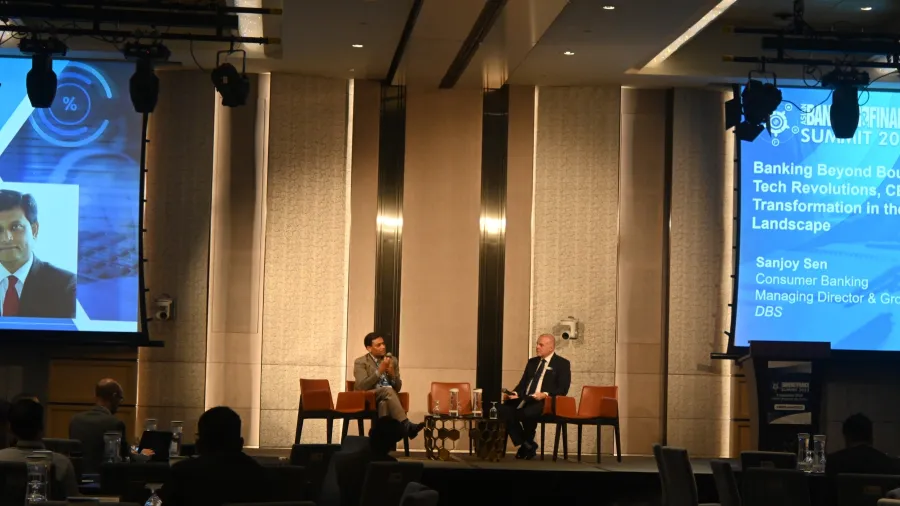
DBS's Sanjoy Sen explores digital currency, future M&A opportunities
Sen also discussed DBS’ recent integration of Citi Taiwan’s assets in just one weekend.
DBS is open for both the impending entrance of digital currencies and other further M&A opportunities following its Citi Taiwan integration, a top executive told Asian Banking & Finance (ABF).
Sanjoy Sen, the managing director and group head of consumer banking for Singapore’s largest bank by assets, recently sat down with ABF’s editor-in-chief Tim Charlton at a speaking session to discuss the various digital transformations taking place in the banking industry– and what it means for DBS.
“We have spent years and years, and billions of dollars re-architecting our core banking,” Sen said at a speaking session at the recently concluded Asian Banking & Finance Summit 2023, held at Sofitel Singapore City Centre, 8 September.
Sen noted DBS’ nature as a technology-enabled bank, and the necessity of crafting a digital product from a customer perspective.
“How do we have the best customer journey? How do we have the best app? How do we ensure that customers can open an account in five clicks?” Sen asked during the event. “That thing is what we have spent a lot of time and investment in, to make us like any other state-of-the-art fintech company.”
Citi Taiwan integration
Sen shared how DBS was able to integrate Citi Taiwan’s consumer assets into DBS with just one weekend. The move propelled DBS to become Taiwan’s biggest foreign bank by assets, with a nearly 40% share in the local credit cards market, and 3 million active credit cards. Before the integration, DBS only had 700,000 cards in Taiwan.
ALSO READ: DBS completes integration of Citi Taiwan consumer business
Sen noted that it was a huge piece of work moving it all in just one weekend, but the payoff was worth it: Citi Taiwan customers only had to wait one weekend to become DBS customers.
“We spent one year creating the requisite technology stack to be able to port the entire Citibank consumer database, so that it could all happen in one step. For one weekend we moved the entire Citibank database– so Saturday evening we shut down the entire Citibank, by Monday morning all the branches have rebranded, all Citibank customers became DBS customers, all 3.5 million card holders will get new plastics,” Sen said.
Typically, the sold bank’s accounts are transferred to the buyer. However, it would take a year or two for the technology transformation to be completed. For instance, an account from a business line that has been sold would move to the buyer, but it would still be managed by Citibank under a transaction services agreement.
“In our case, we don’t believe in that,” Sen said. “We did all in one shot, everything moved over one weekend.”
Acquisition strategy
Asked on where DBS may be looking in for future acquisitions, Sen hinted that the next opportunity may come from the financial technology sector. “Many of these players are looking to get acquired.”
Many FinTech players came from a world where they were amassing investments to grow, but now that game is over, he noted. These companies came from a time where they can rely on investors giving them money for growth even without a clear path to profitability.
It could even be a digital bank–in Hong Kong, that is.
“Six years back, Hong Kong gave licenses to nine digital banks and today, more than half of them are up for sale,” Sen revealed.
ALSO READ: Did digital banks fail to disrupt?
Even before the Citi Taiwan acquisition and integration, DBS had already made M&A moves across the region: first buying a bank in India with 550 branches, then a minority stake in a bank in China.
DBS is looking for three key qualities in any future company they may seek to acquire.
“I would say there are three things. One is that there has to be synergy. When you add two plus two, it has to become five. [Also], how we drive a common culture of inclusiveness.”
“Culture, inclusiveness and synergy, post integration management and technology, these are the key things,” Sen said.
Jury is out for digital currencies
In his speaking session, Sen highlighted three areas that DBS in particular has made significant investments on: blockchain, crypto, and the metaverse. These include the establishment of the DBS Digital Exchange and a separate climate exchange, and even setting up a business that makes use of blockchain to conduct trade and foreign exchange settlements. They are also experimenting in trade finance solutions.
Cryptocurrency, in particular, is of great interest to Sen and DBS.
Sen recalled a conversation he and DBS had in Visa earlier this year about CBDCs, where they noted that 80 central banks across the world are now exploring central bank digital currencies (CBDCs), but not everyone may have the right use case for their plans to come to fruition.
“Each of those 80 central banks have their own use cases, and don’t talk to each other. So every central bank is on FOMO– fear of missing out. Every central bank is creating some sort of CBDC, but they are not all interoperable,” Sen noted.
As an example, Sen noted that India’s central bank is creating a CBDC aimed at financial inclusion. Switch to China, and the use case for digital yuan is for monitoring money movement in the economy.
“So to summarize, I think for CBDC use cases, the jury is out, [and] every government is working on it. We [DBS] will work very closely with the government because we want to be part of that market: to be part of the ecosystem of CBDCs,” Sen said.






![Lorem Ipsum [ABF 1]](https://cmg-qa.s3.ap-southeast-1.amazonaws.com/s3fs-public/styles/exclusive_featured_article/public/2025-03/a_hand_pointing_to_a_futuristic_technology_5b87c9d0e3_1.png.webp?itok=2w0y1WhS)


![Cross Domain [Manu + SBR + ABF + ABR + FMCG + HBR + ]](https://cmg-qa.s3.ap-southeast-1.amazonaws.com/s3fs-public/styles/exclusive_featured_article/public/2025-01/earth-3537401_1920_4.jpg.webp?itok=WaRpTJwE)








 Advertise
Advertise

